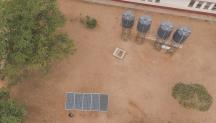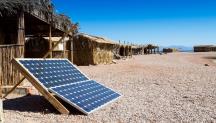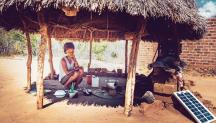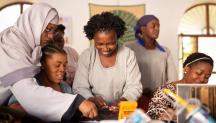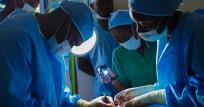
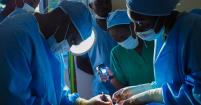
Sustainable Healthcare and Energy Ecosystems for the ‘Last Mile’
Newsletter
When it comes to the delivery of quality healthcare, the vital role played by reliable and affordable energy remains somewhat understated. From emergency care, diagnostics and vaccine refrigeration to communications and record keeping, electricity is indispensable to modern medical services; yet hundreds of millions of people around the world are forced to rely on healthcare facilities that operate without power. For countries with electricity access deficits, the delivery of quality healthcare to isolated, ‘last-mile’ communities poses a huge challenge. Most often, those who suffer the greatest socio-economic costs of this are women and children. Realising that it is critical to quantify and contextualise the energy needs for healthcare facilities, IRENA embarks on a partnership with the World Health Organization, World Bank and SEforAll to develop the Global Assessment of Electricity in Healthcare Facilities report.
The COVID-19 pandemic has highlighted the urgent need for properly-equipped and fully functional 24-hour healthcare facilities, both for testing and treatment of the disease. Furthermore, once a vaccine is available, remote rural providers in low-income countries will need additional energy for refrigeration – as even among those that do have power, supply remains unreliable. This could potentially derail the target of universal access to healthcare by 2030 set by the UN Sustainable Development Goals.
Decentralised renewable energy (DRE) provides a clean, reliable and affordable solution that can substantially accelerate progress towards universal, sustainable healthcare access. Where energy supply for healthcare facilities has been improved, marked progress has also been noted in the number of patients served and treatments offered. However, energy systems supplied to unelectrified health facilities on one-time grants have been known to run into trouble within a few years due to unclear ownership and lack of funds for operation and maintenance (O&M).
With public health services often being delivered free of charge for the rural poor, raising funds for sourcing and maintaining energy systems poses a considerable challenge – particularly in the absence of services from private enterprises, discouraged by poor commercial viability. Addressing this issue and ensuring the sustainability of these systems require commitments from both the energy and health communities. In this regard, IRENA has been actively promoting dialogue and knowledge-sharing to bring these communities together and to learn from experts on the ground. These exchanges highlight the importance of an enabling ecosystem to ensure the quality and sustainability of energy for health services.

Long-term sustainability goes beyond installing solar panels on buildings – it requires the creation of an ecosystem that includes supportive policies, flexible budgets for O&M, tailored financing, demand aggregation for greater economies-of-scale and technological innovation (including medical appliances suited for DRE-based rural use). All of these aspects also provide clear entry points for private sector involvement. But above all, the joint cooperation of energy and health authorities is vital to establish ownership structures and institutional oversight.
Energy solutions must consider current and future needs for medical services and appliances, as well as aspects such as energy efficiency and building design.They must also explore opportunities for enhanced communication and telemedicine. Most importantly, however, an enabling ecosystem will require the right people with the right skills.
This holistic ecosystem forms the basis of IRENA’s approach to supporting its members around the globe in electrifying their rural health facilities using renewable energy. IRENA is currently working with Burkina Faso for example, using the holistic ecosystem approach to power progress toward sustainable development and healthcare provision.

Expert Insight by:
Ali Yasir
Programme Officer – Decentralised Renewable Energy, Country Engagement and Partnerships, IRENA
© IRENA 2025
Unless otherwise stated, material in this article may be freely used, shared, copied, reproduced, printed and/or stored, provided that appropriate acknowledgement is given of the author(s) as the source and IRENA as copyright holder.
The findings, interpretations and conclusions expressed herein are those of the author(s) and do not necessarily reflect the opinions of IRENA or all its Members. IRENA does not assume responsibility for the content of this work or guarantee the accuracy of the data included herein. Neither IRENA nor any of its officials, agents, data or other third-party content providers provide a warranty of any kind, either expressed or implied, and they accept no responsibility or liability for any consequence of use of the content or material herein. The mention of specific companies, projects or products does not imply that they are endorsed or recommended, either by IRENA or the author(s). The designations employed and the presentation of material herein do not imply the expression of any opinion on the part of IRENA or the author(s) concerning the legal status of any region, country, territory, city or area or of its authorities, or concerning the delimitation of frontiers or boundaries.
